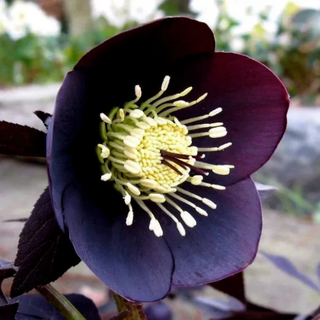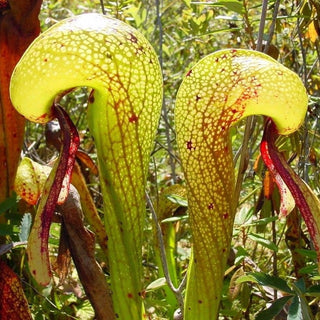COBRA LILY Darlingtonia californica
- Unit price
- / per
Description
Darlingtonia californica, also called the California pitcher plant, cobra lily, or cobra plant, is a species of carnivorous plant. It is native to Northern California and Oregon growing in bogs and seeps with cold running water. This plant is designated as uncommon due to its rarity in the field.
The name "cobra lily" stems from the resemblance of its tubular leaves to a rearing cobra, complete with a forked leaf - ranging from yellow to purplish-green - that resemble fangs or a serpent's tongue.
In cultivation in the UK this plant has gained the Royal Horticultural Society’s Award of Garden Merit.
Note the small entrance to the trap underneath the swollen 'balloon', and the colorless patches that confuse prey trapped inside.
The cobra plant is not only restricted to nutrient-poor acidic bogs and seepage slopes, but many colonies actually thrive in ultramafic soils, which are in fact basic soils, within its range. In common with most carnivorous plants, the cobra lily is adapted to supplementing its nitrogen requirements through carnivory, which helps to compensate for the lack of available nitrogen in such habitats.
In addition to the use of lubricating secretions and downward-pointing hairs common to all North American pitcher plants to force their prey into the trap, this species carefully hides the tiny exit hole from trapped insects by curling it underneath and offering multiple translucent false exits. Upon trying many times to leave via the false exits, the insect will tire and fall down into the trap. The slippery walls and hairs prevent the trapped prey from escaping. The only other species that utilizes this technique is the Parrot Pitcher Plant, Sarracenia psittacina.
Like many other carnivorous plants of temperate regions, cobra lilies require a cold winter dormancy to live long-term. Plants die down to their rhizomes in frigid winters and will maintain their leaves in cool winters during their dormancy period. This period lasts from 3 to 5 months during the year, and all growth stops. As spring approaches, mature plants may send up a single, nodding flower, and a few weeks later the plant will send up a few large pitchers. The plant will continue to produce pitchers throughout the summer, however much smaller than the early spring pitchers.
Type: Hardy perennial
Hardiness zones: 7-10 planted outdoors, or grow indoors.
Height: 12-36"
Seeds per pack: 5
Availability: If these seeds are showing out of stock, we strongly recommend joining our wait list, as these seeds have a very shorty viability window, and this helps ensure you get the freshest seeds possible! If they are available, they will only be available for a short time.
Germination: These seeds require a cold stratification period of 4 weeks. A soil mixture of peat and perlite at a 1:1 ratio works well. Surface sow seeds on the soil mix, spritz down with a spray bottle to get seeds to settle. Place the container with the spritzed seeds in a sealed ziploc bag in the fridge to complete the cold stratification period.
After the cold stratification period, remove the seeds from the fridge and bring up to room temperature in a bright sunny location. Seeds will germinate better in a humid environment, this can be done by covering the container with cling wrap. Place the container in a dish with either rain, distilled or reverse osmosis water. Do not let the soil dry out. Regular tap water will likely end up killing the plants. They should germinate in approximately 3 months.
COBRA LILY Darlingtonia californica
- Unit price
- / per
Multiple secure payment options available.
Adding product to your cart
You may also like
Description
Darlingtonia californica, also called the California pitcher plant, cobra lily, or cobra plant, is a species of carnivorous plant. It is native to Northern California and Oregon growing in bogs and seeps with cold running water. This plant is designated as uncommon due to its rarity in the field.
The name "cobra lily" stems from the resemblance of its tubular leaves to a rearing cobra, complete with a forked leaf - ranging from yellow to purplish-green - that resemble fangs or a serpent's tongue.
In cultivation in the UK this plant has gained the Royal Horticultural Society’s Award of Garden Merit.
Note the small entrance to the trap underneath the swollen 'balloon', and the colorless patches that confuse prey trapped inside.
The cobra plant is not only restricted to nutrient-poor acidic bogs and seepage slopes, but many colonies actually thrive in ultramafic soils, which are in fact basic soils, within its range. In common with most carnivorous plants, the cobra lily is adapted to supplementing its nitrogen requirements through carnivory, which helps to compensate for the lack of available nitrogen in such habitats.
In addition to the use of lubricating secretions and downward-pointing hairs common to all North American pitcher plants to force their prey into the trap, this species carefully hides the tiny exit hole from trapped insects by curling it underneath and offering multiple translucent false exits. Upon trying many times to leave via the false exits, the insect will tire and fall down into the trap. The slippery walls and hairs prevent the trapped prey from escaping. The only other species that utilizes this technique is the Parrot Pitcher Plant, Sarracenia psittacina.
Like many other carnivorous plants of temperate regions, cobra lilies require a cold winter dormancy to live long-term. Plants die down to their rhizomes in frigid winters and will maintain their leaves in cool winters during their dormancy period. This period lasts from 3 to 5 months during the year, and all growth stops. As spring approaches, mature plants may send up a single, nodding flower, and a few weeks later the plant will send up a few large pitchers. The plant will continue to produce pitchers throughout the summer, however much smaller than the early spring pitchers.
Type: Hardy perennial
Hardiness zones: 7-10 planted outdoors, or grow indoors.
Height: 12-36"
Seeds per pack: 5
Availability: If these seeds are showing out of stock, we strongly recommend joining our wait list, as these seeds have a very shorty viability window, and this helps ensure you get the freshest seeds possible! If they are available, they will only be available for a short time.
Germination: These seeds require a cold stratification period of 4 weeks. A soil mixture of peat and perlite at a 1:1 ratio works well. Surface sow seeds on the soil mix, spritz down with a spray bottle to get seeds to settle. Place the container with the spritzed seeds in a sealed ziploc bag in the fridge to complete the cold stratification period.
After the cold stratification period, remove the seeds from the fridge and bring up to room temperature in a bright sunny location. Seeds will germinate better in a humid environment, this can be done by covering the container with cling wrap. Place the container in a dish with either rain, distilled or reverse osmosis water. Do not let the soil dry out. Regular tap water will likely end up killing the plants. They should germinate in approximately 3 months.
You may also like
You may also like
Recommended Products
CUSTOMERS ARE ALSO BUYING THESE
Testimonials
Here's What Some Of Our Customers Had To Say (Thank you!)

Ferri Seeds is truly a wonderful company. They take the utmost care when delivering your seeds. Mine arrived promptly and when I had any questions, they were so happy to help me. I am looking forward to getting more from them soon. Thank you David for making this a delightful experience.

I got these pretty quickly and in perfect order. I can't wait to see what they look like once I plant them. I have another colour and they were so pretty I had to try these. I have used this seller a few times now with great success, and will again. Everything I have ordered has been of good quality!

I was impressed with Ferriseed’s selection of seeds. Ordering was a breeze and the seeds arrived in a perfect little padded envelope in 9 days. I am very happy and will order from here again. Many thanks.

Never grew coleus from seed, and it was surprisingly easy. They germinated quickly on my heat mat and grow lights. Can't wait to see them in the garden!

We placed our order on Thursday and received it on Monday. Here in Canada the tracking link is accurate. Ferri seeds tells you when they're shipping and when your order is delivered, the seeds arriving in excellent condition. We will definitely be ordering again this spring. Keep up the good work!

Great product ! All seeds germinated and flourished nicely.

My order, made late afternoon, April 27th, and needed in a bit of a rush, was mailed next morning and arrived in my rural mailbox in BC, May 5th.
Thank you for your cheerful, friendly emails and prompt service. I certainly recommend you others and will be sure to keep an eye on the range of seeds you offer in future.

Gt the delivery on time. One week since i potted the seeds. Some of the seeds are already sprouting so i am very happy so far. No complaints yet

Thank you Ferri Seeds for the timely shipments of seeds I ordered. I have been looking to replace that plant for years.

Excellent service, (fastest!!) Great packaging. Also very appreciated is all of the information on how to 'deal' with perennial seeds! Will order again!! Thank you

Ferri Seeds – one of the best online and most helpful businesses I have ever had dealings with. Quick turnaround, dispatch, and beautifully packaged seeds. What more could you want – beautiful flowers would be nice. Well I am sure they will turn out to be.

The seeds came just as described. I appreciate the good follow-up to my questions also.

Fantastically seedlings. They were well packaged. I planted them right away and they’re growing nicely so far.

Fast service, amazing communication!

I happened across Ferri Seeds website when I Googled a particular plant I’d been looking for. I was impressed by their selection of all types of seeds and their good product descriptions along with detailed germination instructions. I found the site and ordered on a Saturday. On Sunday I got a notice that my order had been shipped! The seeds were in my P.O. box on Friday. Such amazing service. It’s too early to comment on germination rates — I’ve just started the stratification process today.

Received in 1-2 weeks in Canada, Ontario. Everything is as ordered. No issues. Ordered through the official web site.

The Japanese anemone seeds arrived promptly. Thank you Ferri Seeds!!

Very fast I am excited

Customer service excellent. Was able to order streptocarpus seeds. Hard to find.

Thank you for having showy Asters., Birdsnest Delphiniums and Colbalt Delphiniums and Obedient plant seeds in Stock. My butterfly garden is almost now complete. And I am cold stratificationing the seeds.

I had a herbarium project with a short deadline. Ferri Seeds were professional, friendly and sent me Alstroemeria seeds promptly. The seeds arrived in a protective sleeve within a letter envelope. The herbarium is complete! I highly recommend Ferri Seeds! Thank you!

Very good seller!

Very satisfied, quick service

It's been a pleasure dealing with Ferri Seeds!

Amazing selection. Fast service. I look forward to ordering in the future.
We carry a diverse selection seeds from around the world, many are rare and hard to find!
Regular new seed stock, special cold/dry storage facility, and record keeping ensures our stock is fresh and ready to grow for you.
When you sign up, you are agreeing to receive promotional emails and other marketing communications from us. In the future, you can always unsubscribe.


